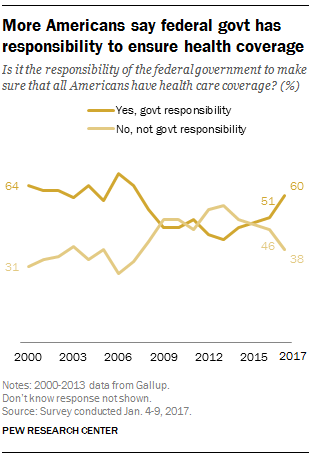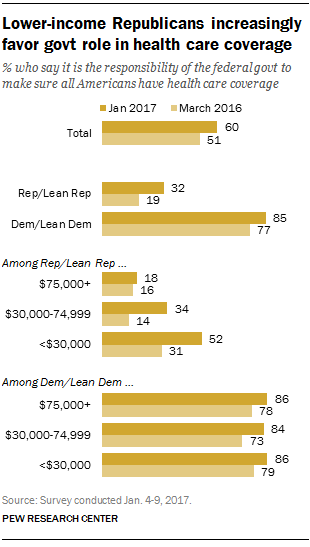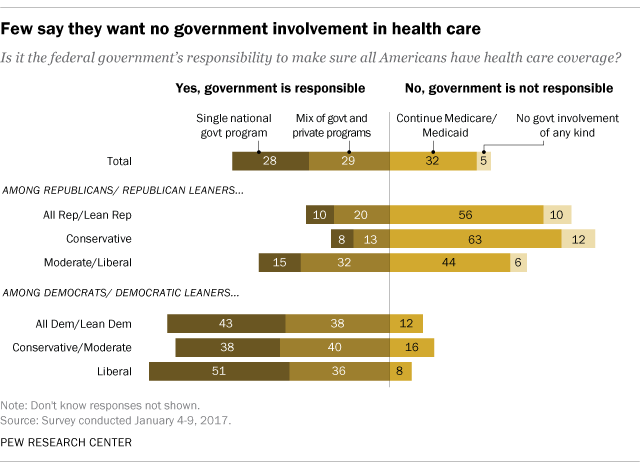As the debate continues over repeal of the Affordable Care Act and what might replace it, a growing share of Americans believe that the federal government has a responsibility to make sure all Americans have health care coverage, according to a new Pew Research Center survey.

Currently, 60% of Americans say the government should be responsible for ensuring health care coverage for all Americans, compared with 38% who say this should not be the government’s responsibility. The share saying it is the government’s responsibility has increased from 51% last year and now stands at its highest point in nearly a decade.
Just as there are wide differences between Republicans and Democrats about the 2010 health care law, the survey also finds partisan differences in views on whether it’s the government’s responsibility to make sure all Americans have health care coverage. More than eight-in-ten Democrats and Democratic-leaning independents (85%) say the federal government should be responsible for health care coverage, compared with just 32% of Republicans and Republican leaners.
The survey also finds continued differences on this question by race and ethnicity as well as income. A large majority of blacks and Hispanics (85% and 84%, respectively) say the government should be responsible for coverage, while non-Hispanic whites are split on the issue (49% agree, 49% disagree). And while about three-quarters of those with family incomes of less than $30,000 per year (74%) say the government should ensure coverage, only about half (53%) of those with incomes of $75,000 or higher say the same.

The belief that the government has a responsibility to ensure health coverage has increased across many groups over the past year, but the rise has been particularly striking among lower- and middle-income Republicans.
Currently, 52% of Republicans with family incomes below $30,000 say the federal government has a responsibility to ensure health coverage for all, up from just 31% last year. There also has been a 20-percentage-point increase among Republicans with incomes of $30,000-$74,999 (34% now, 14% last year). But there has been no significant change among those with incomes of $75,000 or more (18% now, 16% then).
Those who think government should ensure health coverage for all are divided on a follow-up question about whether health insurance should be provided through a mix of private insurance companies and the government (29% of the overall public), or if the government alone should provide insurance (28% of the public).

Overall, 43% of Democrats and Democratic leaners support a so-called single payer approach, but this approach is more popular among liberal Democrats (51%) than among conservative and moderate Democrats (38%).
Most of those on the other side of the issue – people who say the government does not have a responsibility to ensure health coverage – say on a subsequent question that the government should continue Medicare and Medicaid (32% of the overall public), while just 5% of the public says the government should have no role in health care.
Among Republicans and Republican leaners, most of whom (67%) say the government does not have a responsibility for ensuring health coverage, there is very little support for the government not being involved in health care at all. Just 10% of Republicans favor no government involvement, while 56% say it should continue Medicare and Medicaid.
While Republicans in Congress have already taken the first steps toward repealing the ACA, Americans remain largely divided on what Congress should do with the health care law. Overall, in a Pew Research Center survey in December, 39% said it should be repealed, while an equal share (39%) said the law should be expanded. Just 15% of Americans said the law should be left as is. Although the public is divided on the future of the law, there is bipartisan support for a number of ACA provisions. Regardless of their personal views of the law, a small majority (53%) expects its major provisions will likely be eliminated.
A December Kaiser Family Foundation survey shows repealing the law is not the public’s top health care priority for President-elect Donald Trump and the next Congress. Lowering the amount individuals pay for health care tops the list, with 67% of Americans saying it should be a top priority for the next administration. This is followed by lowering the cost of prescription drugs (61%) and dealing with the prescription-painkiller addiction epidemic (45%). Only 37% of the public says repealing the law should be the administration’s top priority, though views differ widely by party.
Note: Survey topline is available here (PDF). Methodology can be found here.
Related posts:
Public support for ‘single payer’ health coverage grows, driven by Democrats
Most patients in U.S. have high praise for their health care providers